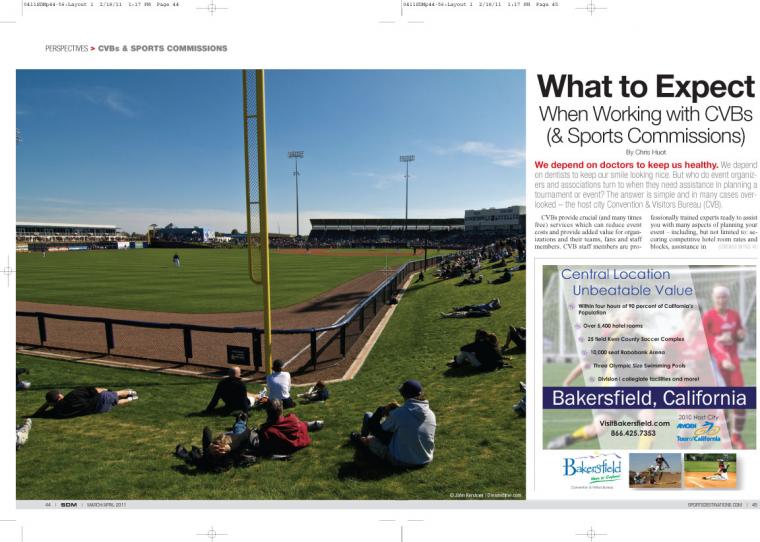
 |
| © John Kershner - Dreamstime.com |
We depend on doctors to keep us healthy. We depend on dentists to keep our smile looking nice. But who do event organizers and associations turn to when they need assistance in planning a tournament or event? The answer is simple and in many cases overlooked - the host city Convention & Visitors Bureau (CVB). CVBs provide crucial (and many times free) services which can reduce event costs and provide added value for organizations and their teams, fans and staff members. CVB staff members are professionally trained experts ready to assist you with many aspects of planning your event - including, but not limited to: securing competitive hotel room rates and blocks, assistance in booking local venues, providing registration, housing and welcome services, marketing and public relations, securing off-site entertainment, and most importantly providing monetary incentives to bring an event to a particular city.
The services CVBs provide can save your organization time, money and resources, relieving stress and freeing planners to focus on other important tasks. However, many event planners may not know what to expect or how to include a CVB in the event planning process.
Before The Event
 |
| Photo by Dennis G. Esler - www.eslerphoto.com |
In the infant stages of the event process an organization may be searching for new host cities, but unsure which location provides the best fit. Research may turn up a handful of potential cities, but how does a small or volunteer organization evaluate cities and venues without incurring travel costs? In short many organizations will solicit bids from potential host cities. Generally the bid is compiled and responded by the potential host city CVB.
Once your organization decides how it will distribute the Request for Proposal, expect to work closely with multiple CVBs in the bidding process. The CVBs expect an overview of your event including venue specifications, catering requirements, hotel needs and arguably the most important piece of the puzzle - economic impact.
 |
| © Walter Arce - Dreamstime.com |
In a previous Perspectives column (Evaluating Economic Impact, Sept/Oct 2009), I discussed the importance of measuring and including economic impact when soliciting your event to various CVBs:
The economic impact events carry is the backbone of most CVBs' existence. By understanding the importance of calculating and evaluating economic impact, event planners can undoubtedly create a demand for their event within a community. If, as a planner, you have not made it standard to include an economic impact analysis of your event in your RFP, you may have missed a prime opportunity to receive benefits for your organization or participants - just by showing up!
Every event has some economic impact on a community, especially if it involves out of town guests requiring a night or two stay at a local hotel. No matter the size or scope of your event, attempt to place a value on it and showcase it in the RFP.
 |
| © Peter Muzslay - Dreamstime.com |
During the bid process, expect the CVBs from each city to outline incentives and services it can and will provide before, during and after your event. If your organization plans to sign a multi-year contract, anticipate the need to discuss long term issues with the CVB during the negotiation process. In fact, it will be almost certain, especially for regional and statewide events, the CVB will insist on signing a multi-year contract. This can be mutually beneficial for all parties involved. Long-term agreements allow organizations to create a demand for sponsorships, attendance and advertising at the event. By continuously bringing an event back to a city or venue, organizers can build relationships with the local community - so be prepared to discuss this option with the CVB.
 |
| © Jamie Roach - Dreamstime.com |
After your organization has selected a host city you should be well acquainted with what exactly the CVB plans to assist your organization with before agreements are signed. Arguably the most important pieces of assistance include financial incentives and securing hotel room rates and blocks.
Financial incentives can come in many different forms and combinations. Incentives can be financial assistance in the form of venue rental reimbursement, cash payments and incentive-based reimbursements. Other forms of incentives include hotel rebates, sponsorship and complimentary hospitality venues at the event itself. The CVB will analyze the scale and scope of your event and determine what incentives provide an equitable trade off. Even if your event is a small regional event drawing 150 room nights for two nights, there is still economic impact to the CVB's stakeholders and community. The CVB will recognize this and decide what incentives to offer to the event organizers. As with anything, terms and incentives are normally up for negotiation - so be prepared to make a counter offer.
 |
| © Alexander Gordeyev - Dreamstime.com |
Does your organizer expect the CVB to outline potential incentives and services during the bidding process? Then make sure the organization clearly states what incentives it expects within the RFP or discuss options directly with the local CVB before bids are due. Do anticipate the CVB wanting to agree on any incentive package before any public announcement is made regarding the event.
Another perk of working with a CVB is the ability for its sales staff to secure competitive room rates and blocks for your event attendees, staff and officials. The CVB will assist in finding the right lodging accommodations for your event. At this point the CVB staff will want to know what complimentary room ratio you require (number of complimentary rooms to number of booked rooms) and the type of hotel property and room layout which works best for your attendees. Once you get the details ironed out, the CVB staff will go to work for you. Keep in mind, the CVB staff is only as effective as the information they are provided with - so make sure to provide as much information as possible. Don't forget to ask question as well; the more both parties understand each other, the better the outcome will be.
 |
| Swimmers competing in the high school league championships. © Chad Mcdermott - Dreamstime.com |
After all the I's are dotted and T's are crossed in the event contract, be prepared to work with the group sales/housing and marketing/public relations arms of the CVB. Your group is very important to the local community and thus the CVB should roll out the red carpet for your arrival, right? In most cases, the host CVB will play an integral role in publicizing your event to promote attendance, participation and awareness. As an event planner, be prepared to provide a lot of information about your event and work to make the job of the CVB as easy as possible. Media constantly seek stories which require little work on their part (of course, the media folks won't tell you that). The more information and resources you can provide to the CVB staff, the more effective they can be in publicizing your event. It is reasonable for the CVB to expect the event planner to provide key information (who, what, when, where, why), high resolution pictures of the event from past years, unique aspects of the event and most importantly the names and contact information for multiple officials who are authorized to speak on behalf of the organization.
As I mentioned in a previous Perspectives piece (May/June 2010):
With the convergence of media and the rise of user-generated content event organizers are now able to effectively reach target markets with limited resources. A well-constructed media relations strategy can elevate the status of smaller events and solidify the position of larger events - all to the benefit of the event planner, governing bodies, spectators and participants.
By leveraging the expertise of the in-house PR staff at the CVB, you can easily gain extra and free exposure for your event, but there are limitations. CVB PR staffs are great at getting the word out to the local community, as they have built rich relationships with local media. However, they may not be the experts on the specifics of your event. Therefore,they will want to make sure they get all the correct information from the event planner and be able to contact someone within the organization on short notice - you never know when the media will call!
As the event draws closer, the event planner will receive periodic updates as it relates to housing and other aspects of the event the CVB may be overseeing. If the CVB is providing online housing, planners should be able to track lodging reservations in real time. If the CVB provides this amenity, planners should use it to its fullest extent, as it provides a glimpse into the overall success of the event.
When in doubt, contact the CVB to clarify any questions or concerns you may have before the day of the event. Once event day arrives the excitement builds, the players take the field, the crowd cheers...and it is probably too late to correct the problem.
During the Event
As the event day begins, it's important to clearly define what role the planner anticipates CVB staff to take. In many communities the CVB will allocate staff to assist with registration or other small administrative duties. Although the CVB is there to assist event planners in any way possible, keep in mind planners should not expect CVB staff members to replace paid staff, team managers or venue personnel. The CVB is happy to show its support by handing out attendee gift bags, staffing a hospitality tent or operating a mobile visitor information center - but don't expect them to do tasks which should already be taken care of by the event organizers.
How CVB staff is utilized can make a very good impression on the event attendees and is one of the most overlooked benefits a CVB may provide. A quick inquiry during the planning process can lead to substantial benefits for attendees during the event.
After the Event
After the last goal is scored and the champions have been crowned it is time to begin focusing on next year's event. Remember the discussion about the benefits of multi-year contracts? Here's where it comes in handy. After a couple of weeks to collect thoughts and reorganize, the CVB should set up a debriefing with the event planner. This is a great time to discuss the successful aspects of the event and the areas where the CVB, event venue, planner or everyone can improve. This is also a great time to discuss how to grow community involvement for future years. If you have a multi-year contract in place, all parties can look to improve upon the previous year's event. By the end of the three or five year contact, the event will hopefully be run like a well-oiled machine and both parties will be eager to sign a new long-term agreement.
Although the event is over, unfortunately the work is not. Your event may have been the largest event in a particular city for the year - but now the CVB wants you to prove it. As an event planner, try to assess how valuable the event was to the community through an economic impact analysis. Provide this to the CVB, key local officials and stakeholders. This sets the foundation for next year's event - and with the knowledge of how to work efficiently with the local CVB, you're ready to have the best event possible.

